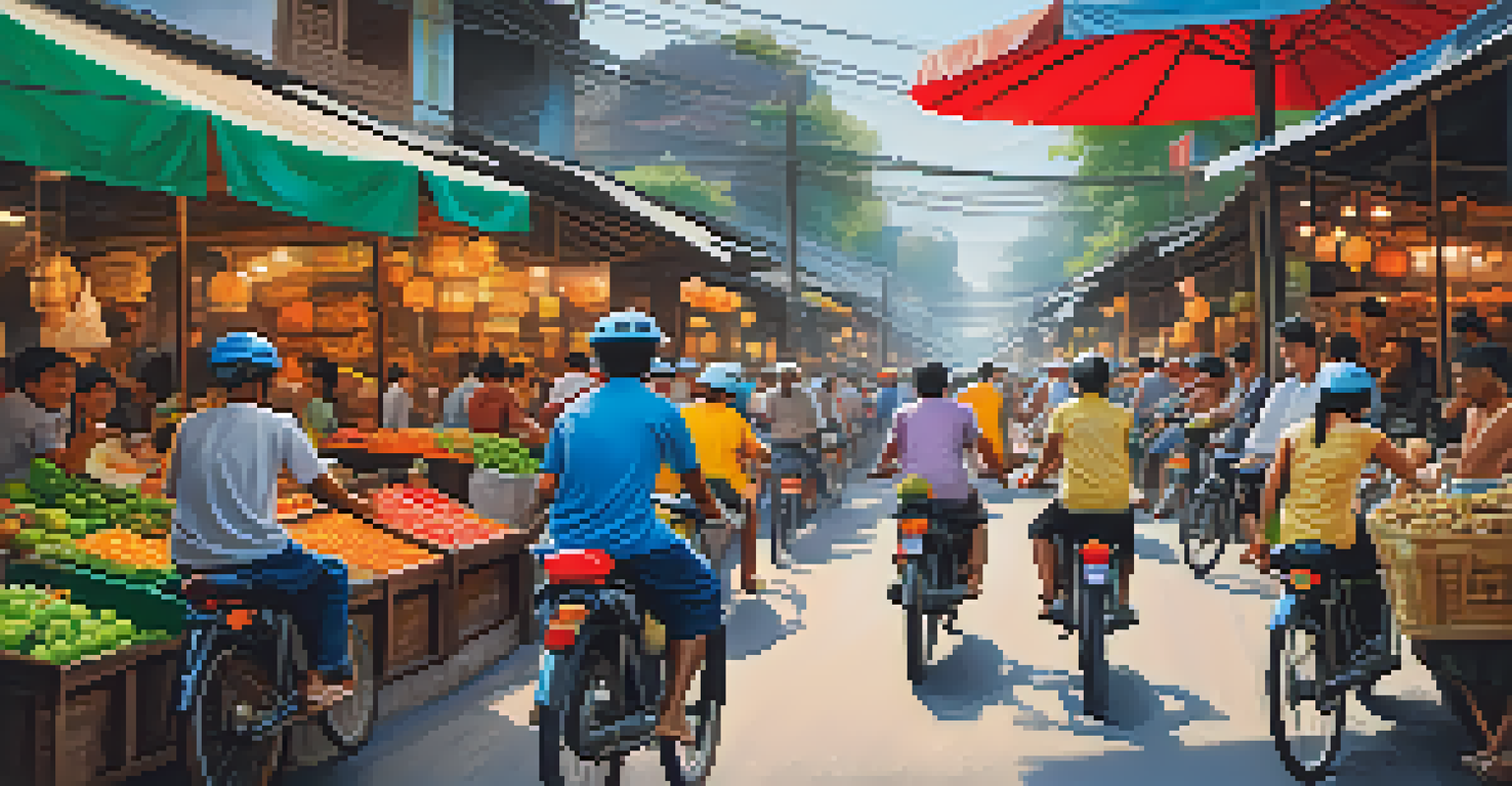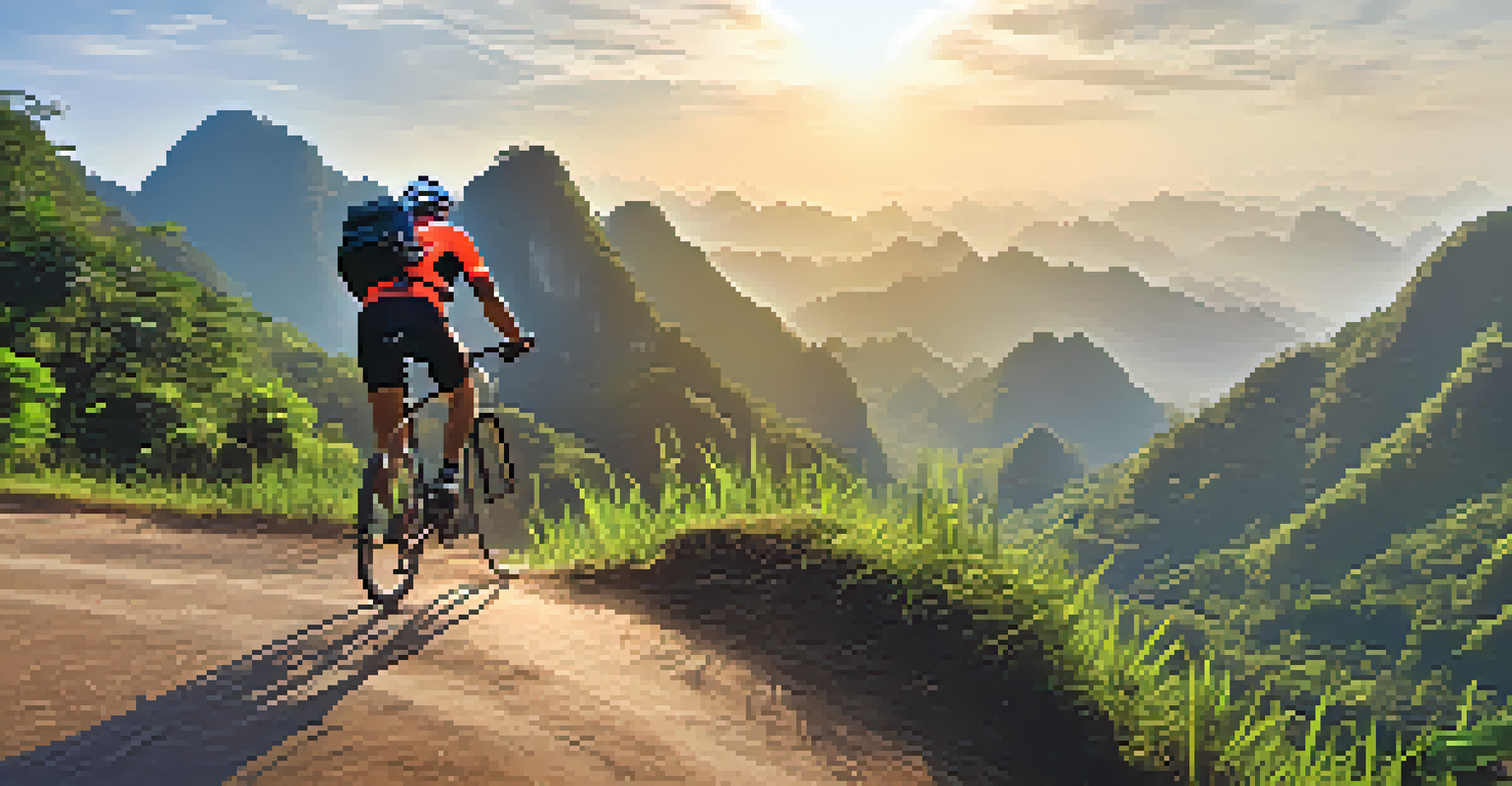Cycling Through Thailand: Safety Tips for Tourists

Understand Local Traffic Rules Before You Ride
Before you hop on your bike, it’s crucial to familiarize yourself with Thailand's traffic rules. Unlike many countries, vehicles in Thailand drive on the left side of the road, which can be a bit disorienting for tourists. Make sure to pay attention to local signs and signals, as they may differ from what you're used to.
The journey of a thousand miles begins with one step.
Take some time to observe how locals navigate the roads. You’ll notice that they often use hand signals to communicate their intentions, which is a good practice to adopt. Understanding the flow of traffic can help you feel more at ease while cycling.
Remember, the goal is to blend in with local riders rather than stand out as a tourist. This not only enhances your safety but also enriches your experience as you engage more authentically with the local culture.
Choose the Right Cycling Route for Your Skill Level
Thailand offers a diverse range of cycling routes suited for different skill levels. If you're new to cycling or prefer a gentle ride, consider flat paths along scenic coastlines or tranquil countryside roads. These routes often allow you to soak in the beautiful landscapes without the stress of challenging terrains.

For the more adventurous, Thailand’s mountainous regions provide exhilarating climbs and breathtaking views. However, make sure you're adequately prepared for such rides, both in terms of physical fitness and equipment. A good understanding of your capabilities ensures a more enjoyable experience.
Understand Local Traffic Rules
Familiarizing yourself with Thailand's unique traffic rules and local riding habits is essential for a safe cycling experience.
Researching your route in advance can help you avoid busy roads and hazardous areas. Don't hesitate to ask locals for recommendations—they often know the best hidden trails that you might not find in guidebooks.
Wear Proper Safety Gear to Stay Protected
Wearing the right safety gear is essential for any cyclist, especially when navigating unfamiliar roads. A well-fitting helmet is non-negotiable; it can significantly reduce the risk of head injuries in case of an accident. Don’t forget to wear comfortable clothing that allows for easy movement.
Life is like riding a bicycle. To keep your balance, you must keep moving.
Reflective gear or bright colors can enhance your visibility on the road, especially during early mornings or late evenings. Consider investing in lights for your bike, as they can be a lifesaver in low-light conditions. Safety should always be your top priority.
Additionally, make sure to carry a basic first-aid kit with you. Accidents can happen, and being prepared can help you address minor injuries quickly, allowing you to get back on your ride sooner.
Stay Hydrated and Energized During Your Ride
Cycling in Thailand's warm climate can be quite taxing, so staying hydrated is crucial. Be sure to carry a water bottle with you and take regular breaks to sip. You can easily find local vendors selling refreshing drinks along the way, but it’s always best to have your own supply on hand.
In addition to hydration, keeping your energy levels up is important. Pack some healthy snacks like nuts or energy bars to refuel during your ride. Stopping for a quick snack can also give you a moment to soak in the scenery and relax.
Wear Proper Safety Gear
Equipping yourself with a well-fitting helmet and reflective gear is crucial for staying protected while cycling in unfamiliar areas.
Listen to your body; if you’re feeling fatigued or overheated, don’t hesitate to take a break. Finding shade or a comfortable spot to rest can make a big difference in your overall cycling experience.
Be Aware of Your Surroundings While Cycling
Staying vigilant is key when cycling in Thailand. Constantly scan your surroundings for any potential hazards, such as potholes, stray animals, or sudden changes in traffic. By being aware of your environment, you can react quickly and avoid accidents.
It's also wise to anticipate the behavior of other road users. Keep an eye out for motorbikes, which are prevalent in Thailand and can sometimes weave in and out of traffic. Being prepared for the unexpected will help you navigate the roads more confidently.
If you're cycling through busy towns or cities, consider using bike lanes whenever available. These designated paths can provide a safer space away from the hustle and bustle of traffic, allowing you to enjoy your ride while minimizing risks.
Know Emergency Contacts and Local Resources
Before setting off on your cycling adventure, familiarize yourself with local emergency contacts. In case of an accident or any urgent situation, knowing who to call can make all the difference. Keep a list of important numbers, such as local hospitals or bike repair shops, stored in your phone.
It’s also a good idea to learn a few basic phrases in Thai. Simple phrases like 'help' or 'emergency' can be invaluable in a crisis. Locals are often more than willing to assist, especially if you can communicate your needs.
Stay Hydrated and Energized
Maintaining hydration and energy levels during your ride is vital due to Thailand's warm climate and can enhance your overall cycling experience.
Additionally, consider using a cycling app that can track your route and provide assistance in case of an emergency. These tools can give you peace of mind, allowing you to focus on enjoying the ride rather than worrying about what might happen.
Respect Local Customs and Etiquette While Riding
When cycling through Thailand, it’s essential to respect local customs and etiquette. This includes being courteous to both pedestrians and other cyclists. A simple 'thank you' or a friendly wave can go a long way in fostering goodwill.
If you’re riding through religious or cultural sites, be mindful of the dress code and local practices. In some areas, it’s customary to dismount your bike when entering certain places such as temples. Taking the time to understand and follow these customs enhances your travel experience.

Always remember that you are a guest in another culture. Being respectful and open-minded will not only keep you safe but will also allow you to forge deeper connections with the local community.